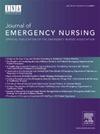突如其来的损失:遗落者的遗言。
IF 2.3
4区 医学
Q2 EMERGENCY MEDICINE
引用次数: 0
摘要
简介:死亡是不可避免的,但是突然失去所爱的人给那些悲伤的人带来了额外的挑战。关于在医院环境中突然失去亲人的幸存者的经历,现有的数据有限。为了确定哪些资源(如果有的话)对那些在医院环境中突然失去亲人的人有益,需要进一步的研究来了解以前的经验。方法:采用解释性描述方法探讨医院环境中突然失去亲人的幸存者的经历和意义。对8名参与者进行了半结构化访谈,涉及在医院环境中突然失去亲人的问题。结果:在访谈前对潜在的参与者进行筛选,以确定在18岁或以上经历过突然失去亲人的幸存者,失去25岁以上的人,说英语,在医院环境中24至48小时内失去亲人的幸存者。定性数据显示4个主题和1个副主题。讨论:在医院环境中,从突然失去所爱的人中幸存下来是一种独特的、个性化的经历;然而,这项研究的数据表明,经历之间存在共性。主题揭示了参与者即将到来的厄运,承认生活的“新现实”,离开医院时由于遥远的、交易性的护理而情绪低落。了解在医院环境中突然失去亲人的经历之间的相似之处,可能为为幸存者和工作人员开发教育和实际资源铺平道路。在为突然失去亲人的幸存者提供护理时,有必要实施建立在意识基础上的教育资源。本文章由计算机程序翻译,如有差异,请以英文原文为准。
Sudden Loss: The Bereaved Voices of Those Left Behind
Introduction
Death is inevitable, but the sudden loss of a loved one presents additional challenges particularly to those navigating grief. Limited data are available about survivors’ experience when losing a loved one suddenly in a hospital setting. To determine what resources, if any, would be beneficial to individuals who suddenly lose a loved one in a hospital setting, further research is needed to understand previous experiences.
Methods
An interpretive descriptive methodology was used to explore the experiences and meaning of being a survivor of sudden loss within the hospital setting. Semistructured interviews were conducted with 8 participants regarding the sudden loss of a loved one in a hospital setting.
Results
Potential participants were screened before interviews to identify survivors who had experienced sudden loss at the age of 18 years or older, had lost someone older than 25 years, and were English speaking and whose loss occurred within 24 to 48 hours in the hospital setting. Qualitative data revealed 4 themes and 1 subtheme.
Discussion
Surviving the sudden loss of a loved one within a hospital setting is a unique, individualized experience; however, data from this research reveal that commonalities among experiences exist. Themes revealed feelings of imminent doom for the participants, acknowledging the “new reality” of life and leaving the hospital emotionally drained owing to the distant, transactional care received. Understanding the similarities among experiences of sudden loss in a hospital setting may pave the way for the development of educational and practical resources for survivors and staff. Implementing education resources built upon awareness is necessary when providing care to survivors of sudden loss.
求助全文
通过发布文献求助,成功后即可免费获取论文全文。
去求助
来源期刊
CiteScore
3.10
自引率
11.80%
发文量
132
审稿时长
46 days
期刊介绍:
The Journal of Emergency Nursing, the official journal of the Emergency Nurses Association (ENA), is committed to the dissemination of high quality, peer-reviewed manuscripts relevant to all areas of emergency nursing practice across the lifespan. Journal content includes clinical topics, integrative or systematic literature reviews, research, and practice improvement initiatives that provide emergency nurses globally with implications for translation of new knowledge into practice.
The Journal also includes focused sections such as case studies, pharmacology/toxicology, injury prevention, trauma, triage, quality and safety, pediatrics and geriatrics.
The Journal aims to mirror the goal of ENA to promote: community, governance and leadership, knowledge, quality and safety, and advocacy.

 求助内容:
求助内容: 应助结果提醒方式:
应助结果提醒方式:


